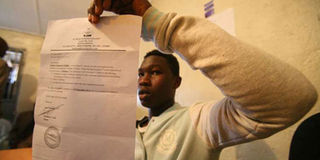State discrimination against Kenyan Nubians is an abuse of rights

Mohammed Abdalla displays a college admission letter at a press conference in Kibera on August 3, 2015 in which the chairman of Nubian Rights Forum, Shafi Ali, claimed that Nubian youth had been denied national identity cards. PHOTO | EVANS HABIL | NATION MEDIA GROUP
What you need to know:
After independence, tribe became the main factor determining which groups and regions would be allocated public resources.
- Those belonging to non-indigenous ethnic groups were forced to use patronage networks to access their rights as citizens.
- This led to politics of exclusion, which, unfortunately, seems to have become more entrenched under the UhuRuto government, which has created a perception that Kenya now belongs mainly to two tribes.
Last week I talked about how government departments have been infiltrated by so-called “agents” who collect bribes on behalf of their colleagues before a particular service, such as obtaining a passport or an ID, can be rendered.
This week I am going talk about people in Kenya who have been denied IDs and passports for more than a century, not because they failed to pay a bribe, but simply because they are Nubians.
Adam Hussein Adam, whose ancestors were brought to Kenya from the Sudan by the British to serve in the King’s African Rifles, was one such person. Adam was born and grew up in Kenya but was denied a Kenyan ID and passport for most of his life. For this reason, he failed to secure a place on the national rugby team and could not accept a scholarship to study in New Zealand. He got several offers from international organisations to work abroad, but could not take them up because he did not possess a passport.
When Adam applied for a Kenyan passport, he was told to his bring parents’, grandparents’ and great-grandparents’ birth certificates, which was impossible, as his parents’, grandparents’, and great-grandparents’ generations had no birth certificates.
Between 1992 and 2000 Adam unsuccessfully applied for a Kenyan passport five times. After producing 13 documents to prove his identity, he was finally invited for an interview. He was told by immigration officers that Nubians are not regarded as Kenyans. His passport was denied and so he remained stateless.
Although Adam eventually managed to obtain a Kenyan passport in 2003, he filed a case in the High Court seeking an interpretation as to whether Nubians are Kenyans. The High Court told him to collect 120,000 signatures from Nubians plus documentation proving their identities. Adam thought it was strange that a court would ask Nubians for identification documents since these were the very documents that were being denied them and for which he had gone to court in the first place.
TOOK CASE
In 2006, he took his case to the African Commission on Human and People’s Rights and also petitioned the African Committee of Experts on the Rights and Welfare of the Child. In 2011, these organisations found that Kenya had violated the rights of Nubian children to non-discrimination, nationality, and protection against statelessness.
Sadly, Adam will not get to enjoy the fruits of his years of championing Nubians’ rights — he died this month at the age of 46. However, he will be remembered for his relentless campaign to force Kenya to recognise the rights of Kenya’s Nubian community.
Nubians, like Somalis, Asians, the Swahili, and other coastal Muslims who are deemed to be “non-indigenous”, are among Kenya’s unrecognised tribes whose members have had to continually prove their rights to citizenship because, since independence, the Kenyan state has decided who is an “insider” and who is an “outsider” and which territorial spaces they should occupy.
(Even though there is considerable debate on which groups in Kenya are really “indigenous” as many of the country’s ethnic groups migrated to Kenya from other parts of Africa at some point).
During colonial times, race was a determinant of privilege and territorial access. The British reserved the so-called White Highlands and other high potential agricultural areas for themselves. Cities and towns were zoned into European, Indian, and African areas, with each race having varying degrees of access to services. Indians were not allowed to own agricultural land or to become farmers, while Africans were expected to live in “reserves” on their own ancestral land. The Northern Frontier District was treated as hostile territory and the ethnic Somalis living there were marginalised.
After independence, tribe became the main factor determining which groups and regions would be allocated public resources. Those belonging to non-indigenous ethnic groups (the second-class citizens) were forced to use patronage networks to access their rights as citizens. (For example, if it was not for an initiative led by the Ismaili community in Kenya that facilitated Kenyan Asians’ access to ID cards in the 1990s, I might have never obtained that document.)
This led to the politics of exclusion, which, unfortunately, seems to have become more entrenched under the UhuRuto government, which has created a perception that Kenya now belongs mainly to two tribes.





